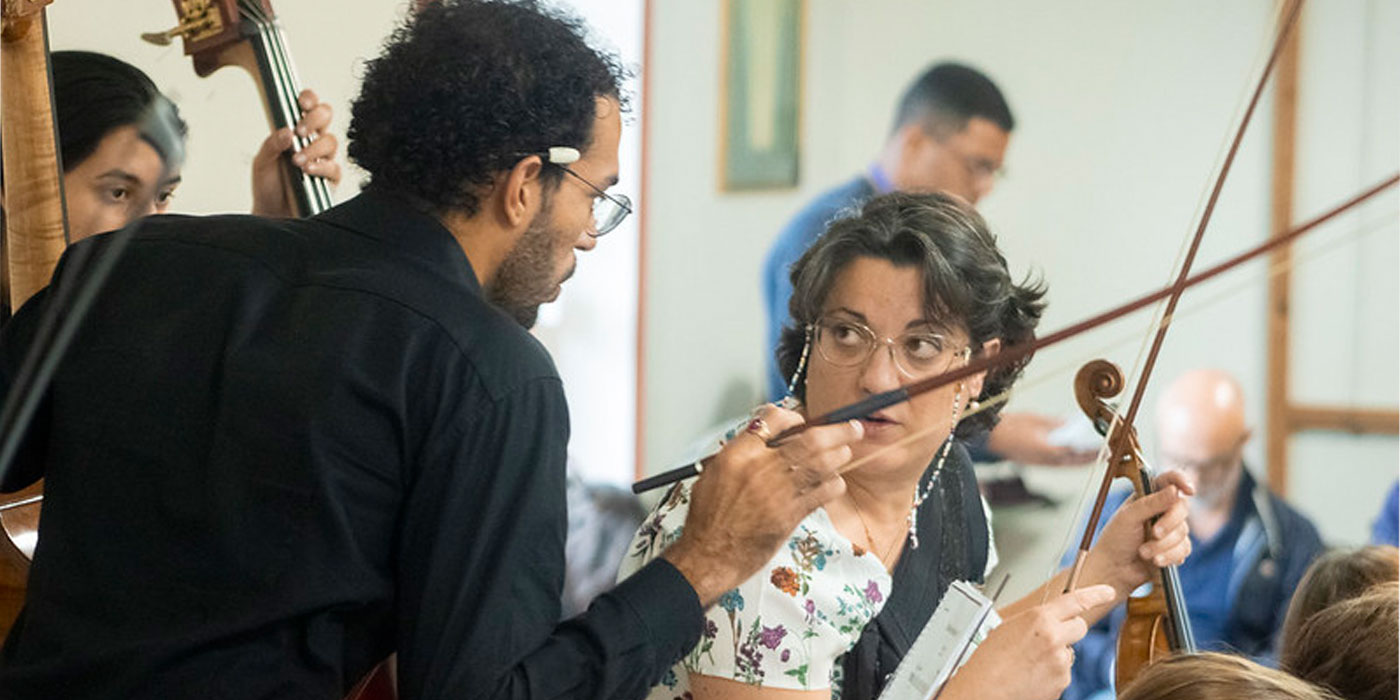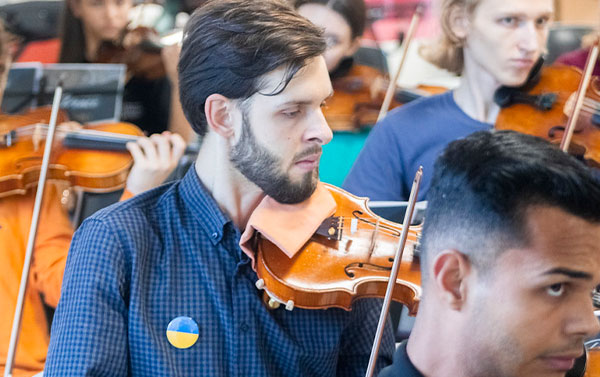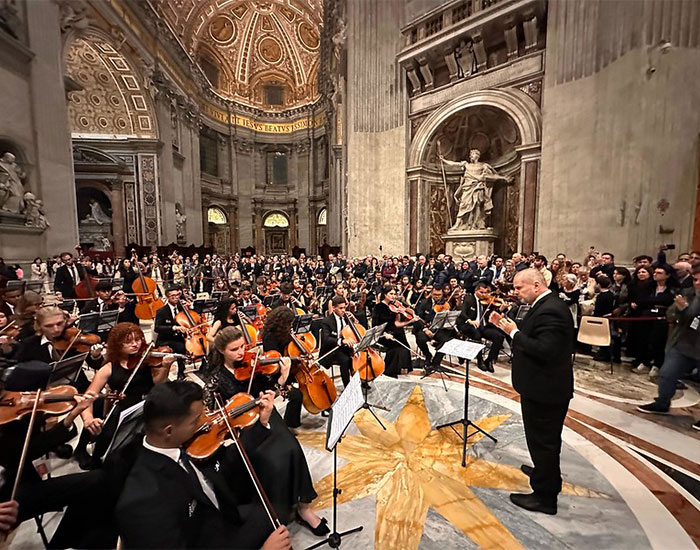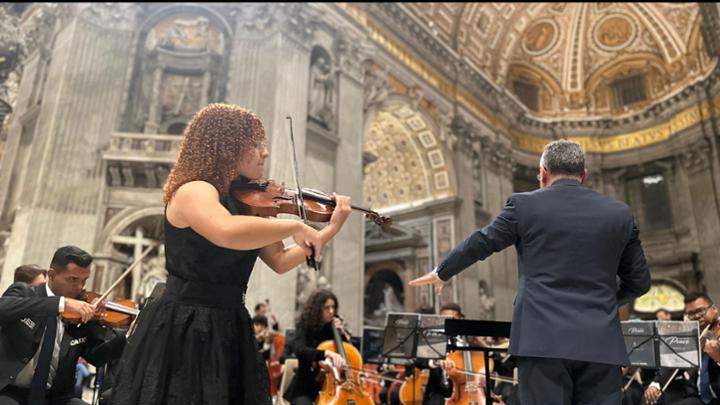Lanfranco Marcelletti Jr. traveled from Texas Tech to the Vatican to conduct for a special audience member and for a special purpose.
Pope Francis makes his way across the marble floor leading into the Paul VI Room of the Vatican. His movement is slow, but his excitement is palpable. Before him sit 53 musicians performing the “Concert for Peace.”
Musicians from 15 to 50 years old pull bows along stringed instruments, their eyes quickly moving back and forth across the sheet music on their stands. The group has been rehearsing all week, perfecting their sound not only for the pope but also for the 4,000 audience members for this November concert.
Conducting the orchestra as Pope Francis enters is Texas Tech University’s Director of Orchestral Studies Lanfranco Marcelletti Jr. He marks time with his baton, leading the musicians through the overture from Handel’s “Messiah.”
The orchestra is composed of musicians from different countries. At many stands, Ukrainians and Russians sit side by side.

From the first rehearsal of the week, the group set out to see if they could prove the slogan of the concert.
In art, there is no war.
An Inconceivable Image
Before Marcelletti came to Texas Tech in 2022, he conducted orchestras in Brazil, the U.S. and Mexico. He was living in Aguascalientes, Mexico, when the opportunity at Texas Tech arose.
Torn with both love for living in Latin America and curiosity about the program in the J.T. & Margaret Talkington College of Visual & Performing Arts, he decided to make Lubbock his new home. As he started his tenure at Texas Tech, Marcelletti also accepted the role of music director for the Recife Symphony Orchestra, in his hometown.
He splits his time between the two.
“A part of my heart will always be in Brazil,” Marcelletti said.
The conductor’s mother is Brazilian, his father is Italian – making Marcelletti’s second language Italian, although he is fluent in six.
One of the experiences in Brazil that Marcelletti holds most dear is his time working with Orquestra Criança Cidadã. He oversaw this program from 2011-2012 and again from 2020-2021, connecting children living in violence and poverty with a free music program.
Housed in a military base for safety, children spend time in lessons and rehearsals.

“I learned more from those children than they ever learned from me,” Marcelletti said.
Many of the children in the program have seen someone killed in front of them. Music and the outlet it provides is only the beginning of the support needed to work through the trauma. So, in addition to music, students are fed three meals a day, given clothing, doctor visits and help with their studies, along with access to clinical psychologists.
After handing the project over to Jose Renato Accioly, Marcelletti resumed conducting professional orchestras full time but remains involved with the program. Since his first tenure, the musicians from Orquestra Criança Cidadã have traveled the world and appeared in concerts of all kinds led by Accioly and the project’s president, João José Rocha Targino.
One of these concerts was for the Pope in 2014.
So, when Accioly and Targino recently dreamed up a “Concert for Peace,” they reached out to Charis International: the service organization for the global Catholic Church. Charis’ director proposed the idea to the Pope, who agreed the idea was a good one, and timely.
“Once they had buy-in, Accioly called me and asked if I’d help,” Marcelletti said.
They needed someone who could speak English, Portuguese and Italian. Marcelletti was happy to serve as translator.
“No, you must conduct, too!” Accioly insisted over the phone.
So, the collaboration began in April. Selecting music, recruiting musicians and planning for the trip. There would be Brazilian and Italian musicians, but Charis International really hoped they could encourage Ukrainian and Russian musicians to participate.
An inconceivable image.
Yet slowly, musicians came forward willing to try the musical experiment of sorts.
“We were successful in finding organizations that recruited Russian musicians on our behalf, but Ukrainian organizations were a different story,” Marcelletti recalled. “We had to make personal connections with Ukrainians in order to get them there.”
Any Ukrainian musicians came of their personal willingness.
What Does That Make Me?
On Oct. 31, musicians from four countries and all ages arrived at the hotel where the rehearsals took place.
“We had no idea how this would play out,” Marcelletti said.
He watched the musicians unpack their instruments. Each attached a pin with their country’s flag to their shirt, a way to help with media coverage.


At first, they were quiet. Executing scales and excerpts as they warmed up.
Eventually, a 14-year-old violinist spoke up.
“I don’t want to wear a pin,” she said.
The conductors assured her she didn’t have to if it made her uncomfortable.
“It’s not that,” she said. “I just don’t know which one to wear.”
She explained that her mother was Ukrainian, and her father was Russian.
“So, what does that make me?” she asked, her bright eyes scanning the room for an answer.
Slowly, the pins disappeared.
“Let’s just make music,” another musician said.
So, they did.
A Small War Won
Over the next few days, a miracle occurred.
“It was a beautiful thing,” Marcelletti said. “There truly was no division.”
Criança Cidadã had arranged separate buses to take the musicians to and from rehearsals. They separated buses for Ukrainians and Russians to avoid any uncomfortable feelings. After one rehearsal, the musicians told the organizers to save money on the second bus. They didn’t need it.
They all ate together, played chess and even arranged some soccer matches. They created a WhatsApp group to stay connected after the trip.
In rehearsals, they collaboratively discussed bowings, style and phrasing.
“We never talked about the war,” Marcelletti said.
The one time it did come up was when a second violinist from Ukraine expressed that he wished leaders could discuss peace like the musicians were discussing Beethoven.
The Ukrainian violinist was one of the quieter ones in the group. His quietness was not fueled by anger, but rather sorrow.
“My family screamed at me when I told them I was coming here,” he told Marcelletti, eyes downcast.
His family was unable to comprehend playing side –by side with Russians.
Marcelletti sat silently listening to him. There was little he could say that made anything better, but he listened as the musicians shared their sadness, their frustrations and their joy.

“We didn’t obtain world peace,” Marcelletti said. “No global crisis was fixed by the music we played. But we did create our own peace.”
Marcelletti says it reminded him of music’s purpose.
“Performing arts require people to come together to create,” Marcelletti said. “They come with their various backgrounds, beliefs and worldviews and find a way to create something beautiful.”
Pope Francis delivered a short speech to the people gathered, speaking of acceptance and peace. He challenged the listeners to see beyond what is front of them – to look and listen to other perspectives.
“I think our concert did that,” Marcelletti said.
“We live in a very polarized world, with everyone believing they are correct,” Marcelletti said. “It is true that there is good and evil and that sometimes people do cruel things. But taking sides will not solve that.”
Marcelletti admits he does not know how the crises in the world will be solved.
He has no profound wisdom.
He says he does know, though, that like music, it will take determination and practice. It will take empathy.
“The one thing I learned from this experience is that we all have our own internal wars,” he said. “When we allow outer conflicts to harden our hearts, to fuel prejudice and judgment, that’s when we lose the inner war.”
What Marcelletti saw in the musicians he conducted was a small war won.
“There are a lot of tensions those musicians had no control over,” he said, “but they took what they could control and showed the world peace.”

